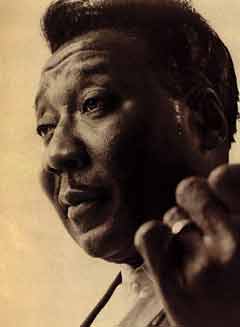Muddy Waters
|
McKinley Morganfield (Muddy Waters) was born on the Stovall
Plantation in Rolling Fork Mississippi in 1915. Muddy got his nickname as a child by playing in the muddy buyou
behind his grandmother‚s house. Muddy was raised by his grandmother and worked in the fields of the Stovall Plantation.
Muddy worked in the field during the day, and played guitar at night in small houses for whoever would listen and
for whatever they could give to him.
Well, they‚d come get me on time for parties, but they wouldn‚t bring me back on time. And like lot of mornings
I get home and change my little ironed blue jeans and put on my cotton-picking clothes and go out to the field
and work.(Margaret McKee, and Fred Chisenhall, Beale Black & Blue(B,B,B), Louisiana State
University Press, Batton Rouge, 1981 p.232)
Muddy also supplemented his earnings by making whiskey on the side.
|
 |
In 1941 Alan Lomax traveled to Mississippi to find and record Robert Johnson. Lomax was informed that
Johnson had recently died, but Son House, another blues musician, referred him to Muddy. Lomax recorded Muddy from
11 a.m. to 6 p.m. After the session Muddy ran off to play at a juke joint. Lomax sent Muddy two copies of the recording
and twenty dollars, which was quite a bit of money for the time. Lomax returned the following year and recorded
Muddy a second time.
Muddy left Mississippi in 1943 for Chicago. It was said that Muddy left because his field boss left Stovall
for the army and was replaced by a manager that Muddy did not get along with. Muddy had also grown out of small
town life and craved something more. "Waters wanted more than Clarksdale could offer him."(Lawrence
Cohn, Nothing But the Blues(NBB): The Music and the Musicians Abbeville Press, New York, 1993 p.181) Muddy
moved in with family in Chicago and played at house parties and bars. This was where Muddy first gained his audience."Water‚s
fire was searing Chicago‚s clubs before it ignited on record."(NBB p.181) Blues was
becoming popular again and Muddy found himself in the center of its rebirth.
Hey, yeah, when they started World War Two, blues people came up to Chicago like mad from down South. That‚s
what made Chicago such a big blues city. When I came in there and got myself settled down, it was the biggest blues
city there was in the books.(Muddy Waters B,B,B p.237)
Muddy was pursued by Chess records shortly after he arrived in Chicago. "Chess was a company just
trying to get off the ground and they was lookin‚ for talent. They had a black dude out, Sammy Goldberg, hustling
up blues talent. And he found me right away." (Muddy Waters B,B,B p.238) Muddy first
recorded as a sideman for Sunnyland Slim in 1947 for Chess‚ Aristocrat label. Soon enough he was the headliner.
"Muddy and his down-home blues were what the newcomers from the South wanted to hear." (B,B,B
p.238) Muddy grew in popularity and established himself and his style in the blues scene.
Muddy continued recording, but his style changed from its Delta origins.
Waters would later tag (his) sound ődeep blues,‚ a dramatic reinvention of the Delta‚s most essential elemental
music. Yet the past was not where Waters truly lived. He was anxious to record with his Headhunters, the terror
of Chicago‚s blues scene.(NBB 183)
He moved away from a down-home style blues to the faster louder blues that was popular in the 1950‚s. Although
Muddy admitted that he thought his earlier recordings were his best he continued to record this faster version
of the blues.
Muddy did not record with his full band until 1953. This was a sign of Muddy‚s power over the record label. Musicians
usually did not have enough clout with the producers to demand that they play with their full band.
|
The 1960‚s were a rough period for Muddy. Stations like WVON (Voice of the Negro) in Chicago and WNOV
in Milwaukee were owned by upper class African Americans who were not playing the blues. This hurt Muddy‚s record
sales. "They don‚t hear Muddy today on the radio or see him on television. And what you can‚t hear you‚ll
never like."(NBB p.370) Through this dry spell Chess was still recording Muddy‚s songs,
even though they weren‚t selling. Different packaging was experimented with and some people wet so far as to try
to get Muddy to change his style to appeal to new musical crazes.
Chess Records struggled to get Muddy Water‚s singles back onto the rhythm and blues charts and at the same
time packaged his albums as folk music before taking cues from the underground rock phenomenon and recording ősuppression‚
albums, psychedelic LPs, and Muddy-as-godfather-of-rock sessions. Chess‚s black attorney John Burton recalled,
őSome people wanted Muddy to change. When the folk record idiom became popular we tried to sell Muddy as a folk
artist.‚(NBB p.358)
But Muddy "never really transformed his electric Chicago ensemble act into that of a őfolk singer,‚." (NBB p.359) Other bluesmen were willing to make this transition because of the money involved.
|
 |
The revival of the blues in 1960, due largely to European influence, reinstated Muddy and some other
bluesmen to their former glory. Some artists even made enough from shows to live lavish lifestyles, as Muddy did.
Muddy remained in this position until his death in 1983, but his looming presence is still felt in the blues today.
Music Critique



